- Home
- John Boyne
The Boy in the Striped Pajamas (Deluxe Illustrated Edition) Page 4
The Boy in the Striped Pajamas (Deluxe Illustrated Edition) Read online
Page 4
It was on this final morning, when the house looked empty and not like their real home at all, that the very last things they owned were put into suitcases and an official car with red-and-black flags on the front had stopped at their door to take them away.
Mother, Maria and Bruno were the last people to leave the house and it was Bruno’s belief that Mother didn’t realize the maid was still standing there, because as they took one last look around the empty hallway where they had spent so many happy times, the place where the Christmas tree stood in December, the place where the wet umbrellas were left in a stand during the winter months, the place where Bruno was supposed to leave his muddy shoes when he came in but never did, Mother had shaken her head and said something very strange.
‘We should never have let the Fury come to dinner,’ she said. ‘Some people and their determination to get ahead.’
Just after she said that she turned round and Bruno could see that she had tears in her eyes, but she jumped when she saw Maria standing there, watching her.
‘Maria,’ she said, in a startled tone of voice. ‘I thought you were in the car.’
‘I was just leaving, ma’am,’ said Maria.
‘I didn’t mean—’ began Mother before shaking her head and starting again. ‘I wasn’t trying to suggest—’
‘I was just leaving, ma’am,’ repeated Maria, who must not have known the rule about not interrupting Mother, and stepped through the door quickly and ran to the car.
Mother had frowned but then shrugged, as if none of it really mattered any more anyway. ‘Come on then, Bruno,’ she said, taking his hand and locking the door behind them. ‘Let’s just hope we get to come back here someday when all this is over.’
The official car with the flags on the front had taken them to a train station, where there were two tracks separated by a wide platform, and on either side a train stood waiting for the passengers to board. Because there were so many soldiers marching about on the other side, not to mention the fact that there was a long hut belonging to the signalman separating the tracks, Bruno could only make out the crowds of people for a few moments before he and his family boarded a very comfortable train with very few people on it and plenty of empty seats and fresh air when the windows were pulled down. If the trains had been going in different directions, he thought, it wouldn’t have seemed so odd, but they weren’t; they were both pointed eastwards. For a moment he considered running across the platform to tell the people about the empty seats in his carriage, but he decided not to as something told him that if it didn’t make Mother angry, it would probably make Gretel furious, and that would be worse still.
Since arriving at Out-With and their new house, Bruno hadn’t seen his father. He had thought perhaps he was in his bedroom earlier when the door creaked open, but that had turned out to be the unfriendly young soldier who had stared at Bruno without any warmth in his eyes. He hadn’t heard Father’s booming voice anywhere and he hadn’t heard the heavy sound of his boots on the floorboards downstairs. But there were definitely people coming and going, and as he debated what to do for the best he heard a terrific commotion coming from downstairs and went out to the hallway to look over the banister.
Down below he saw the door to Father’s office standing open and a group of five men outside it, laughing and shaking hands. Father was at the centre of them and looked very smart in his freshly pressed uniform. His thick dark hair had obviously been recently lacquered and combed, and as Bruno watched from above he felt both scared and in awe of him. He didn’t like the look of the other men quite as much. They certainly weren’t as handsome as Father. Nor were their uniforms as freshly pressed. Nor were their voices so booming or their boots so polished. They all held their caps under their arms and seemed to be fighting with each other for Father’s attention. Bruno could only understand a few of their phrases as they travelled up to him.
‘…made mistakes from the moment he got here. It got to the point where the Fury had no choice but to…’ said one.
‘…discipline!’ said another. ‘And efficiency. We have lacked efficiency since the start of ’forty-two and without that…’
‘…it’s clear, it’s clear what the numbers say. It’s clear, Commandant…’ said the third.
‘…and if we build another,’ said the last, ‘imagine what we could do then…just imagine it…!’
Father held a hand in the air, which immediately caused the other men to fall silent. It was as if he was the conductor of a barbershop quartet.
‘Gentlemen,’ he said, and this time Bruno could make out every word because there had never been a man born who was more capable of being heard from one side of a room to the other than Father. ‘Your suggestions and your encouragement are very much appreciated. And the past is the past. Here we have a fresh beginning, but let that beginning start tomorrow. For now, I’d better help my family settle in or there will be as much trouble for me in here as there is for them out there, you understand?’
The men all broke into laughter and shook Father’s hand. As they left they stood in a row together like toy soldiers and their arms shot out in the same way that Father had taught Bruno to salute, the palm stretched flat, moving from their chests up into the air in front of them in a sharp motion as they cried out the two words that Bruno had been taught to say whenever anyone said it to him. Then they left and Father returned to his office, which was Out Of Bounds At All Times And No Exceptions.
Bruno walked slowly down the stairs and hesitated for a moment outside the door. He felt sad that Father had not come up to say hello to him in the hour or so that he had been here, but it had been explained to him on many occasions just how busy Father was and that he couldn’t be disturbed by silly things like saying hello to him all the time. But the soldiers had left now and he thought it would be all right if he knocked on the door.
Back in Berlin, Bruno had been inside Father’s office on only a handful of occasions, and it was usually because he had been naughty and needed to have a serious talking-to. However, the rule that applied to Father’s office in Berlin was one of the most important rules that Bruno had ever learned and he was not so silly as to think that it would not apply here at Out-With too. But since they had not seen each other in some days, he thought that no one would mind if he knocked now.
And so he tapped carefully on the door. Twice, and quietly.
Perhaps Father didn’t hear, perhaps Bruno didn’t knock loudly enough, but no one came to the door, so Bruno knocked again and did it louder this time, and as he did so he heard the booming voice from inside call out, ‘Enter!’
Bruno turned the door handle and stepped inside and assumed his customary pose of wide-open eyes, mouth in the shape of an O and arms stretched out by his sides. The rest of the house might have been a little dark and gloomy and hardly full of possibilities for exploration but this room was something else. It had a very high ceiling to begin with, and a carpet underfoot that Bruno thought he might sink into. The walls were hardly visible; instead they were covered with dark mahogany shelves, all lined with books, like the ones in the library at the house in Berlin. There were enormous windows on the wall facing him, which stretched out into the garden beyond, allowing a comfortable seat to be placed in front of them, and in the centre of all this, seated behind a massive oak desk, was Father himself, who looked up from his papers when Bruno entered and broke into a wide smile.
‘Bruno,’ he said, coming round from behind the desk and shaking the boy’s hand solidly, for Father was not usually the type of man to give anyone a hug, unlike Mother and Grandmother, who gave them a little too often for comfort, complementing them with slobbering kisses. ‘My boy,’ he added after a moment.
‘Hello, Father,’ said Bruno quietly, a little overawed by the splendour of the room.
‘Bruno, I was coming up to see you in a few minutes, I promise I was,’ said Father. ‘I just had a meeting to finish and a letter to write. You got here safely then?’
‘You were a help to your mother and sister in closing the house?’
‘Yes, Father,’ said Bruno.
‘Then I’m proud of you,’ said Father approvingly. ‘Sit down, boy.’
He indicated a wide armchair facing his desk and Bruno clambered onto it, his feet not quite touching the floor, while Father returned to his seat behind the desk and stared at him. They didn’t say anything to each other for a moment, and then finally Father broke the silence.
‘So?’ he asked. ‘What do you think?’
‘What do I think?’ asked Bruno. ‘What do I think of what?’
‘Of your new home. Do you like it?’
‘No,’ said Bruno quickly, because he always tried to be honest and knew that if he hesitated even for a moment then he wouldn’t have the nerve to say what he really thought. ‘I think we should go home,’ he added bravely.
Father’s smile faded only a little and he glanced down at his letter for a moment before looking back up again, as if he wanted to consider his reply carefully. ‘Well, we are home, Bruno,’ he said finally in a gentle voice. ‘Out-With is our new home.’
‘But when can we go back to Berlin?’ asked Bruno, his heart sinking when Father said that. ‘It’s so much nicer there.’
‘Come, come,’ said Father, wanting to have none of that. ‘Let’s have none of that,’ he said. ‘A home is not a building or a street or a city or something so artificial as bricks and mortar. A home is where one’s family is, isn’t that right?’
‘Yes, but—’
‘And our family is here, Bruno. At Out-With. Ergo, this must be our home.’
Bruno didn’t understand what ergo meant, but he didn’t need to because he had a clever answer for Father. ‘But Grandfather and Grandmother are in Berlin,’ he said. ‘And they’re our family too. So this can’t be our home.’
Father considered this and nodded his head. He waited a long time before replying. ‘Yes, Bruno, they are. But you and I and Mother and Gretel are the most important people in our family and this is where we live now. At Out-With. Now, don’t look so unhappy about it!’ (Because Bruno was looking distinctly unhappy about it.) ‘You haven’t even given it a chance yet. You might like it here.’
‘I don’t like it here,’ insisted Bruno.
‘Bruno…’ said Father in a tired voice.
‘Karl’s not here and Daniel’s not here and Martin’s not here and there are no other houses around us and no fruit and vegetable stalls and no streets and no cafés with tables outside and no one to push you from pillar to post on a Saturday afternoon.’
‘Bruno, sometimes there are things we need to do in life that we don’t have a choice in,’ said Father, and Bruno could tell that he was starting to tire of this conversation. ‘And I’m afraid this is one of them. This is my work, important work. Important to our country. Important to the Fury. You’ll understand that some day.’
‘I want to go home,’ said Bruno. He could feel tears welling up behind his eyes and wanted nothing more than for Father to realize just how awful a place Out-With really was and agree that it was time to leave.
‘You need to realize that you are at home,’ he said instead, disappointing Bruno. ‘This is it for the foreseeable future.’
Bruno closed his eyes for a moment. There hadn’t been many times in his life when he had been quite so insistent on having his own way and he had certainly never gone to Father with quite so much desire for him to change his mind about something, but the idea of staying here, the idea of having to live in such a horrible place where there was no one at all to play with, was too much to think about. When he opened his eyes again a moment later, Father stepped round from behind his desk and settled himself in an armchair beside him. Bruno watched as he opened a silver case, took out a cigarette and tapped it on the desk before lighting it.
‘I remember when I was a child,’ said Father, ‘there were certain things that I didn’t want to do, but when my father said that it would be better for everyone if I did them, I just put my best foot forward and got on with them.’
‘What kinds of things?’ asked Bruno.
‘Oh, I don’t know,’ said Father, shrugging his shoulders. ‘It’s neither here nor there anyway. I was just a child and didn’t know what was for the best. Sometimes, for example, I didn’t want to stay at home and finish my schoolwork; I wanted to be out on the streets, playing with my friends just like you do, and I look back now and see how foolish I was.’
‘So you know how I feel,’ said Bruno hopefully.
‘Yes, but I also knew that my father, your grandfather, knew what was best for me and that I was always happiest when I just accepted that. Do you think that I would have made such a success of my life if I hadn’t learned when to argue and when to keep my mouth shut and follow orders? Well, Bruno? Do you?’
Bruno looked around. His gaze landed on the window in the corner of the room and through it he could see the awful landscape beyond.
‘Did you do something wrong?’ he asked after a moment. ‘Something that made the Fury angry?’
‘Me?’ said Father, looking at him in surprise. ‘What do you mean?’
‘Did you do something bad in work? I know that everyone says you’re an important man and that the Fury has big things in mind for you, but he’d hardly send you to a place like this if you hadn’t done something that he wanted to punish you for.’
Father laughed, which upset Bruno even more; there was nothing that made him more angry than when a grown-up laughed at him for not knowing something, especially when he was trying to find out the answer by asking questions.
‘You don’t understand the significance of such a position,’ Father said.
‘Well, I don’t think you can have been very good at your job if it means we all have to move away from a very nice home and our friends and come to a horrible place like this. I think you must have done something wrong and you should go and apologize to the Fury and maybe that will be an end to it. Maybe he’ll forgive you if you’re very sincere about it.’
The words were out before he could really think about whether they were sensible or not; once he heard them floating in the air they didn’t seem like entirely the kind of things he should be saying to Father, but there they were, already said, and not a thing he could do to take them back. Bruno swallowed nervously and, after a few moments’ silence, glanced back at Father, who was staring at him stony-faced. Bruno licked his lips and looked away. He felt it would be a bad idea to hold Father’s eye.
After a few silent and uncomfortable minutes Father stood up slowly from the seat beside him and walked back behind the desk, laying his cigarette on an ashtray.
‘I wonder if you are being very brave,’ he said quietly after a moment, as if he was debating the matter in his head, ‘rather than merely disrespectful. Perhaps that’s not such a bad thing.’
‘I didn’t mean—’
‘But you will be quiet now,’ said Father, raising his voice and interrupting him because none of the rules of normal family life ever applied to him. ‘I have been very considerate of your feelings here, Bruno, because I know that this move is difficult for you. And I have listened to what you have to say, even though your youth and inexperience force you to phrase things in an insolent manner. And you’ll notice that I have not reacted to any of this. But the moment has come when you will simply have to accept that—’
‘I don’t want to accept it!’ shouted Bruno, blinking in surprise because he hadn’t known he was going to shout out loud. (In fact it came as a complete surprise to him.) He tensed slightly and got ready to make a run for it if necessary. But nothing seemed to be making Father angry today – and if Bruno was honest with himself he would have admitted that Father rarely became angry; he became quiet and distant and always had his way in the end anyway – and rather than shouting at him or chasing him around the house, he simply shook his head and indicated that their debate w
as at an end.
‘Go to your room, Bruno,’ he said in such a quiet voice that Bruno knew that he meant business now, so he stood up, tears of frustration forming in his eyes. He walked towards the door, but before opening it he turned round and asked one final question. ‘Father?’ he began.
‘Bruno, I’m not going to—’ began Father irritably.
‘It’s not about that,’ said Bruno quickly. ‘I just have one other question.’
Father sighed but indicated that he should ask it and then that would be an end to the matter and no arguments.
Bruno thought about his question, wanting to phrase it exactly right this time, just in case it came out as being rude or uncooperative. ‘Who are all those people outside?’ he said finally.
Father tilted his head to the left, looking a little confused by the question. ‘Soldiers, Bruno,’ he said. ‘And secretaries. Staff workers. You’ve seen them all before, of course.’
‘No, not them,’ said Bruno. ‘The people I see from my window. In the huts, in the distance. They’re all dressed the same.’
‘Ah, those people,’ said Father, nodding his head and smiling slightly. ‘Those people…well, they’re not people at all, Bruno.’
Bruno frowned. ‘They’re not?’ he asked, unsure what Father meant by that.
‘Well, at least not as we understand the term,’ Father continued. ‘But you shouldn’t be worrying about them right now. They’re nothing to do with you. You have nothing whatsoever in common with them. Just settle into your new home and be good, that’s all I ask. Accept the situation in which you find yourself and everything will be so much easier.’
‘Yes, Father,’ said Bruno, unsatisfied by the response.

 Beneath the Earth
Beneath the Earth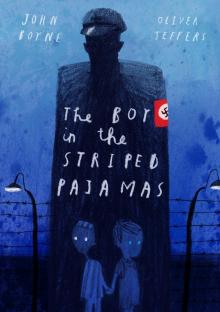 The Boy in the Striped Pajamas
The Boy in the Striped Pajamas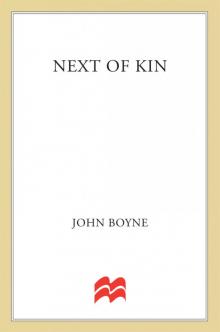 Next of Kin
Next of Kin The House of Special Purpose
The House of Special Purpose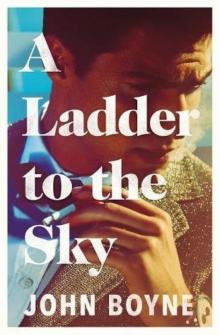 A Ladder to the Sky
A Ladder to the Sky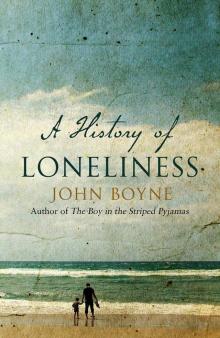 A History of Loneliness
A History of Loneliness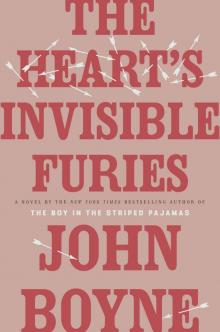 The Heart's Invisible Furies
The Heart's Invisible Furies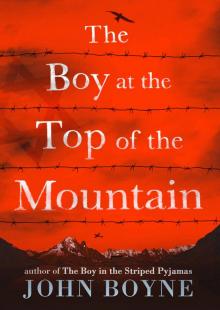 The Boy at the Top of the Mountain
The Boy at the Top of the Mountain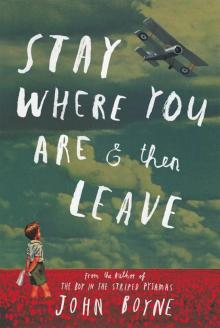 Stay Where You Are and Then Leave
Stay Where You Are and Then Leave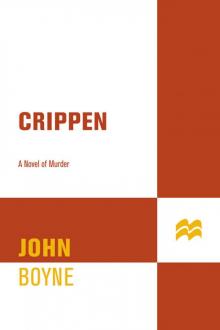 Crippen: A Novel of Murder
Crippen: A Novel of Murder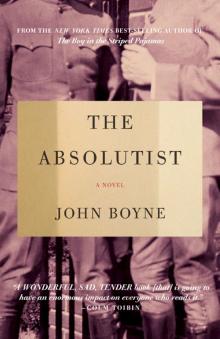 The Absolutist
The Absolutist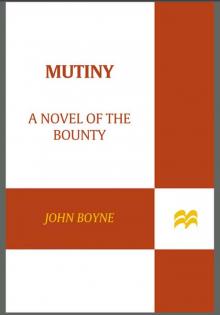 Mutiny: A Novel of the Bounty
Mutiny: A Novel of the Bounty A Traveler at the Gates of Wisdom
A Traveler at the Gates of Wisdom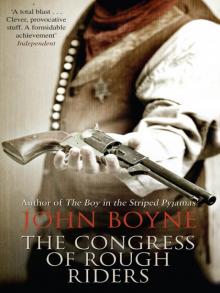 The Congress of Rough Riders
The Congress of Rough Riders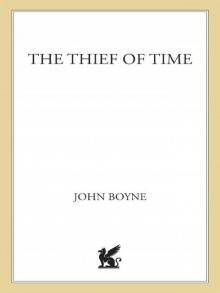 The Thief of Time
The Thief of Time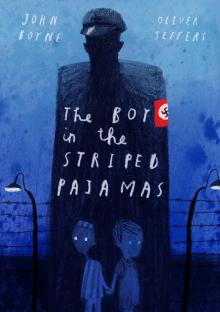 The Boy in the Striped Pajamas (Deluxe Illustrated Edition)
The Boy in the Striped Pajamas (Deluxe Illustrated Edition)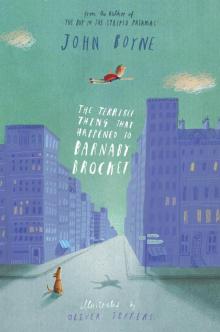 The Terrible Thing That Happened to Barnaby Brocket
The Terrible Thing That Happened to Barnaby Brocket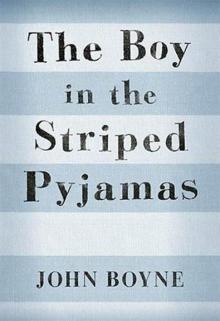 The Boy In The Striped Pyjamas
The Boy In The Striped Pyjamas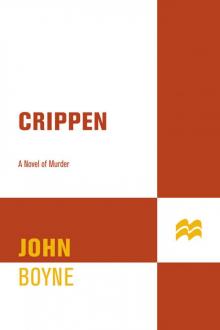 Crippen
Crippen